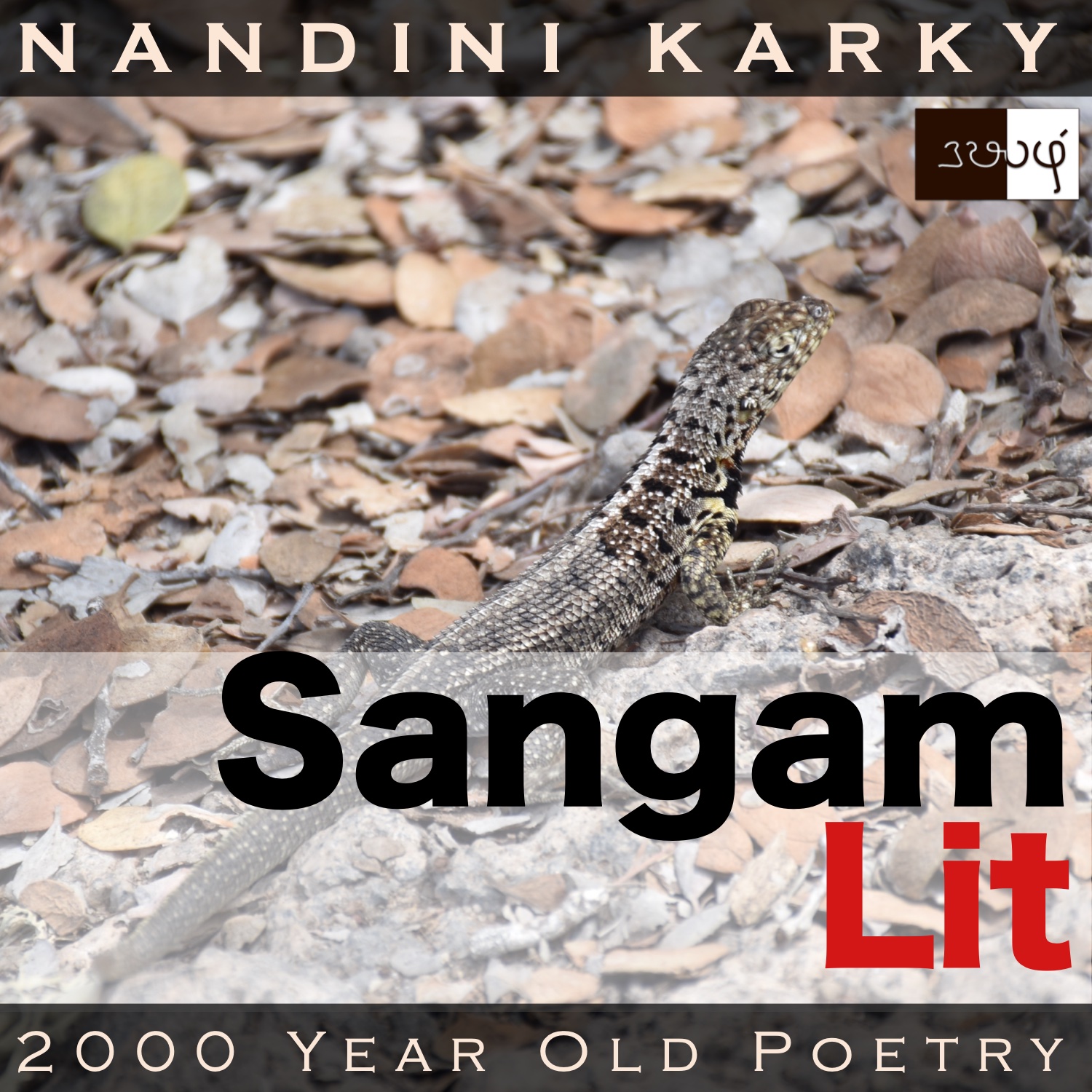Podcast: Play in new window | Download
Subscribe: Apple Podcasts | Spotify | Amazon Music | Android | iHeartRadio | TuneIn | RSS | More

In this episode, we relish a unique simile and the hope it evokes, as portrayed in Sangam Literary work, Kurunthogai 16, penned by Paalai Paadiya Perunkadungko. Set in the drylands of ‘Paalai’, the verse speaks in the voice of the confidante to the lady, conveying a positive thought to alleviate the lady’s suffering about the man’s parting away.
உள்ளார் கொல்லோ தோழி கள்வர்
பொன்புனை பகழி செப்பங் கொண்மார்
உகிர்நுதி புரட்டும் ஓசை போலச்
செங்காற் பல்லி தன்றுணை பயிரும்
அங்காற் கள்ளியங் காடிறந் தாரே.
All about sounds, this one! Opening with a question ‘உள்ளார் கொல்லோ’ meaning ‘won’t he remember?’, the verse makes us wonder if it’s said as a wish or put forth as a doubt. A glimpse of ‘highway robbers’, who inhabit the drylands, can be seen in ‘கள்வர்’. Although the word ‘பொன்’ means ‘gold’ in contemporary times, in the expression ‘பொன்புனை பகழி’, the word refers to ‘iron’, referring to ‘an arrowhead made of iron’. When researching about this curious fact, wherein a word refers to two different metals of varying value, I learnt that this facet of multiple meanings for ‘பொன்’ occurs in Thirukkural as well. The first sound we hear is captured by the words ‘உகிர்நுதி புரட்டும் ஓசை’ meaning ‘the sound arising when flipping with a sharp nail’. This is followed by ‘செங்காற் பல்லி தன்றுணை பயிரும்’ meaning ‘a red-legged lizard calls out to its mate’, filling our ears with the sounds of the wild. The verse ends with ‘காடிறந் தாரே’ meaning ‘he, who parted away to the forest’ and beckons us to connect these sights and sounds observed.
Mating calls and hunting sounds! Going beyond this background score, we learn that the man and lady had been leading a married life when the man left to gather wealth. The lady languishes in his absence and wonders aloud to her confidante whether the man has forgotten her during his travels. To the lady, the confidante replies, “How can he not think of you, my friend? Intending to sharpen their arrows made of iron, robbers scrape the arrow tips with their sharp nails. Akin to that sound, the red-legged lizard calls out to its mate, amidst the beautiful stems of cacti in that drylands forest, through which your man traverses!” With these words, the confidante allays the lady’s anxiety and places a seed of hope about the man’s prompt return.
What could be the connection between the sound effects captured in the verse and the man’s return? Let’s walk a little further in that drylands path to understand. The confidante first mentions the sound of robbers, sharpening and flipping their iron arrowheads with their nails. When we start wondering if she’s highlighting the dangers in the man’s path, she turns to talk about the tender call of a red-legged lizard to its mate, and equates the sound of sharpening arrows to this wild call of love. This very sound of a lizard’s call can be heard arising from the depths of the cacti bushes in the drylands forest that the man is traversing. Mentioning this, the confidante turns to her friend and questions, ‘how can the man not think of you when such sounds are falling on his ears?’. Now, it becomes clear that the confidante is indeed using rhetoric rather than a doubt in her initial question. She intends to clear all doubt in the lady’s mind and promise her that the man will hasten his return to her, when he finds himself surrounded by these fervent calls in nature!
A moment to savour the sounds mentioned in this verse. One is filled with an intention of war, hunting something or someone down in that sharpening of the arrowhead, whereas the other is soaked in love, echoing the innate passion of a lizard. Extraordinary how this ancient poet has employed his skills of observation and made the connection between disparate things in an instance of exquisite creativity. Doesn’t this verse sound like an invitation from the past to pause and listen to the world around us fully?




Share your thoughts...